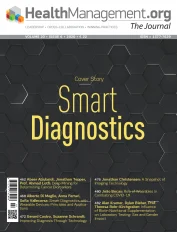
HealthManagement, Volume 20 - Issue 6, 2020
Download PDF |
 |
| PRINT OPTIMISED |
Download PDF |
 |
| SCREEN OPTIMISED |
Editorial
Smart Diagnostics
Diagnostics in healthcare has always been an area that has been downplayed. That is probably why inaccurate and/or delayed diagnosis is something that has persisted in this field for decades. It is a systemic problem that continues to have an impact on patient treatment and outcomes. The solution could potentially lie in smart diagnostics and on devices that could monitor patient health at all times and...
Management Matters
Junior Faculty Support: How To Do It and Why It Matters
An overview of the themes of support from the perspective of junior faculty- the sequence of required processes, the breakdown of these processes and actionable courses that should be taken, both individual and/or institution-based. Junior faculty should be assigned a mentor prior to their arrival at an institution.Trust and confidentiality is the foundation of a mentor-mentee relationship. The availabili...
Magnet Nursing - Employee motivation, medical quality and patient satisfaction in unison
The continuing shortage of qualified care personnel and doctors is forcing hospitals to develop innovative concepts of personnel management in order to attract personnel and bind them over the long term. The concept of ‘Magnet Nursing,’ or the ‘Magnet Hospital,’ which has been practiced successfully in the U.S., provides some insights into a promising new orientation for organising and managing Euro...
What if we Treated Patients More Like Customers?
COVID-19 has ignited the need for data-driven decision making, personalised healthcare and digital delivery. How can the NHS become a customer-focused organisation and reimagine healthcare to meet evolving priorities? To deliver world-leading health outcomes, the NHS needs to get comfortable with new concepts of healthcare delivery.It is now time to consider the full potential of reshaping the NHS’s rela...
Point-of-View
Improved Patient Assessment with MR-proADM
Prof. Carlo Tascini is Head of Infectious Diseases Clinic at Udine University Hospital. Prior to that, he was the Head of First Division of Infectious Diseases Unit at Cotugno Hospital. His field of interests include endocarditis, meningitis, sepsis, MDR bacterial infection and fungal infections. HealthManagement.org spoke to Prof. Tascini about the clinical benefits of MR-proADM. Biomarkers, as standalon...
How AI Orchestration Will be Music to the Ears of Weary Radiologists
How can health organisations speed up AI adoption to gain efficiency, quality and resourcing advantages, without a slow and complex set-up process that could add to the cognitive overload already being experienced by radiologists? Coronavirus has generated greater empathy for the radiology profession and has highlighted the need for a more agile approach to tackling clinical overload in hospitals. The C...
Cover Story
Deep Mining for Determining Cancer Biomarkers
The use of omics data for knowledge discovery is an approach that can be used for personalised cancer medicine and for a better understanding of cancer genotype and phenotype. Three researchers have developed a deep feature learning model to discover biomarkers that are positively and negatively associated with cancer. HealthManagement.org spoke to Abeer Alzubaidi, Jonathan Tepper and Ahmad Lotfi to find o...
Smart Diagnostics with Wearable Devices: Principles and Applications
Life expectancy has increased in the past few decades especially in developing countries, but quality of life of older population can be severely impacted by conditions such as neurodegenerative diseases (dementia, Alzheimer’s, Parkinson’s, etc.). Early detection and treatment of such conditions is key to increasing quality of life for patients and families. Smart diagnostic methods and tools based on w...
Improving Diagnosis Through Technology
As we continue to explore how technology can be used in the diagnostic process, we need to ensure that technology drives diagnostic quality, improving the connection between clinicians and patients in order to provide safe, effective and efficient care. With the rapid advances in healthcare technology, careful consideration is needed as to how to integrate it into the clinical diagnostic processes.Technol...
Artificial Intelligence in Breast Imaging Will Shift the Landscape
The development and refinement of Artificial Intelligence (AI) for use in radiology practice continues. However, this development leads to many questions and concerns. Prof. Baker provides an overview. The development and refinement of Artificial Intelligence (AI) for use in radiology practice is advancing. Scientific journals continue to publish promising data on AI performance, including a recent repor...
A Snapshot of Imaging Technology: Exciting Developments and When to Expect Them
Conversations with thousands of clinicians have given KLAS Research a picture of the current trends in medical imaging technology. Current users’ successes and failures have generated some best practices for successfully implementing new technology. Key Points Enterprise imaging strategies and tools are being widely adopted in many regions. Organisations with effective strategies are achieving positive...
Role of Wearables in Combating COVID-19
The current pandemic has highlighted the importance and usefulness of wearable medical devices during an infectious disease outbreak. An expert on wearables explains the benefits of the technology and urges all the stakeholders to implement it as soon as possible. In isolation, people resort to calling an ambulance if there is an emergency. This reactive system of care leads to unnecessary burden on hospi...
Influence of Biotin Nutritional Supplementation on Laboratory Testing: Sex and Gender Impact
High dose biotin supplementation is most common among females and may cause faulty immunoassay results that delay diagnosis and treatment of serious medical conditions. Biotin, also known as Vitamin B7, is an essential micronutrient that widely functions in the metabolic processing of amino acids, fats, and carbohydrates.The use of biotin supplementation has been disproportionately reported by women.Inter...


















